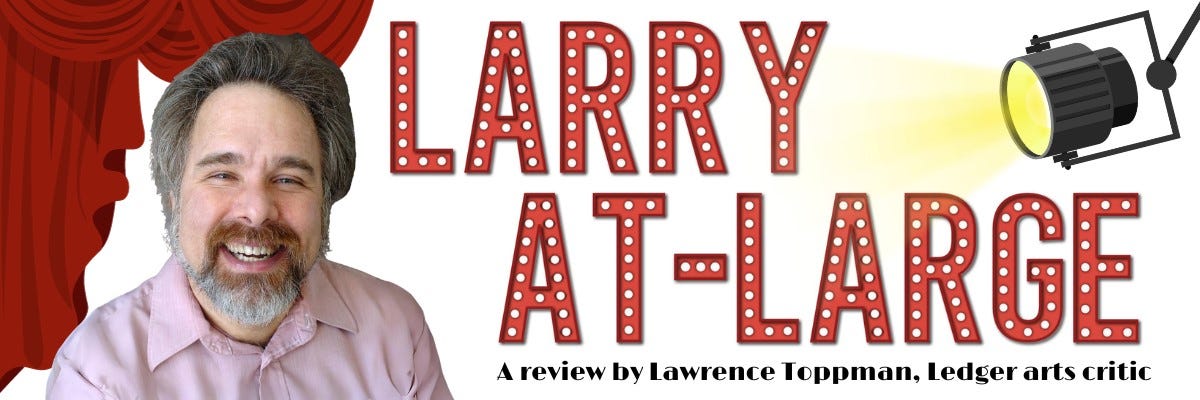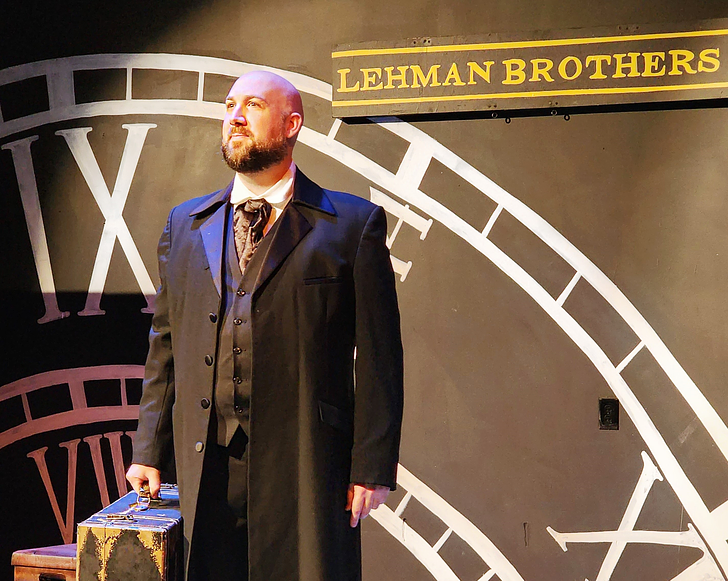Review: 'The Lehman Trilogy' succeeds in showcasing banking family's rise and ruin
Three Bone Theatre's "The Lehman Trilogy" runs through Nov. 18 at the Arts Factory

This review by longtime Charlotte arts critic Lawrence Toppman was published by The Charlotte Ledger on November 5, 2023. You can find out more about The Charlotte Ledger’s commitment to smart local news and information and sign up for our newsletter for free here.
Three Bone Theatre’s 'The Lehman Trilogy' is a fascinating display of an immigrant family's spiral into greed

Actor Kevin Shimko portrays Henry Lehman, a German immigrant who arrives in the U.S. practically penniless and, with his brothers, rises to the heights of American capitalism. (Photo courtesy of Three Bone Theatre)
by Lawrence Toppman
Until I watched “The Lehman Trilogy” Saturday night, I could not conceive of a three-hour drama in which nobody spoke the word “love.” Or “pity,” “charity,” “kindness,” “tenderness,” “mercy” or “forgiveness.” (“Hate” gets tossed around freely, especially in act 3.)
One emotion prevails in the 2022 Tony-winner for best play: fear. Fear of being poor, no matter how rich one becomes. Of failing to outrun or outpunch business competitors. Of failing to expand eternally, like the universe. Of being the mythical shark which, if it stops moving for an instant, dies. Watching this coldly fascinating work, expertly produced at the Arts Factory by Three Bone Theatre, is like watching feeding time in a zoo populated by bankers and stock traders.
The opening moments elicit sympathy from any child of immigrants, as we see Henry Lehman (Kevin Shimko) arrive from Germany with one suitcase, almost no money and less English. He moves to Montgomery, Ala., in the 1840s, opens a fabric and clothing store, and sends for hard-headed younger sibling Emanuel (Becca Worthington) and peacemaking youngest brother Mayer (Scott Tynes-Miller) to help him.
Act 1 chronicles the family’s rise from merchants to cotton wholesalers to participants in the first New York Stock Exchange, with Emanuel as the driving force. Act 2 focuses on Philip, Emanuel’s callously brilliant son (Shimko), who increases the empire’s influence as international investment bankers.
Act 3 takes us from the stock market crash of 1929 through the bank failures of 2008, cramming in more information than we can easily swallow. Bobby (Tynes-Miller), Philip’s child, leaves behind dilettantish behavior for visionary economic policies, until his death puts Lehman Brothers in the hands of soulless money-grubbers who ruin it.
But are they less soulless than the Lehmans, whose walnut-sized hearts might embarrass the Grinch? The Lehmans marry for convenience, ignore wives and children — except as potential executive successors — never do a thing to help anyone but themselves and never show the slightest interest in any subject but money. (Bobby buys paintings by Matisse, Cezanne and Picasso, but as investments.)
When the doddering Emanuel and Mayer belatedly suggest the board of directors might invest in middle-class housing, they’re laughed off. Herbert Lehman, one of Mayer’s sons who served with distinction as a governor and senator from New York, gets mentioned in passing but treated as an odd duck out of step with family dynamics.
The three actors skip nimbly among multiple roles. Author Stefano Massini, whose work Ben Power adapted, requires them to play everything from a 3-year-old tugging at Grandpa’s beard to a Southern plantation owner, and all three become narrators at times. Their changes in voice, face and gestures make every transition apparent, and director David Winitsky has achieved an unusual feat: He gets maximum speed and maximum clarity at the same time. Sound designer Kathryn Harding, almost a fourth actor, helps keep us grounded with music and effects.
Despite the unvarying unemotional tone, the play doesn’t feel long; we wait eagerly to see what will happen. Three Bone’s website calls it “the quintessential story of western capitalism, rendered through the lens of a single immigrant family.” If so, the Lehmans’ saga of headlong acquisitiveness indicates the failure of unrestricted capitalism itself.
Greed can be useful when it fuels a desire to learn, to improve lives, to advance technological progress. But by the end of act 3, when a marketing guru explains to the gleeful Bobby how people can be duped into purchases they don’t need and can’t afford, he and his cohorts are aptly destined for the fourth circle of Dante’s hell.
If You’re Going: “The Lehman Trilogy” runs through Nov. 18 at the Arts Factory, 1545 W. Trade St., in Charlotte. Details: threebonetheatre.com.
Lawrence Toppman covered the arts for 40 years at The Charlotte Observer before retiring in 2020. Now, he’s back in the critic’s chair for the Charlotte Ledger — look for his reviews about two times each month in the Charlotte Ledger.
➡️ For the full collection of his arts reviews for The Ledger, check out the “Larry At-Large” page.
Need to sign up for this e-newsletter? We offer a free version, as well as paid memberships for full access to all 4 of our local newsletters:
➡️ Opt in or out of different newsletters on your “My Account” page.
➡️ Learn more about The Charlotte Ledger
The Charlotte Ledger is a locally owned media company that delivers smart and essential news through e-newsletters and on a website. We strive for fairness and accuracy and will correct all known errors. The content reflects the independent editorial judgment of The Charlotte Ledger. Any advertising, paid marketing, or sponsored content will be clearly labeled.
Like what we are doing? Feel free to forward this along and to tell a friend.
Social media: On Facebook, Instagram, Twitter and LinkedIn.
Sponsorship information/customer service: email support@cltledger.com.
Executive editor: Tony Mecia; Managing editor: Cristina Bolling; Staff writer: Lindsey Banks; Business manager: Brie Chrisman, BC Creative


